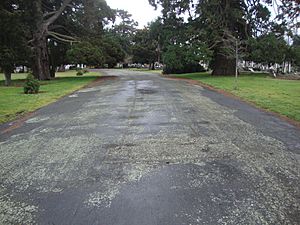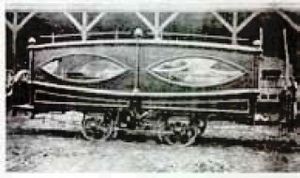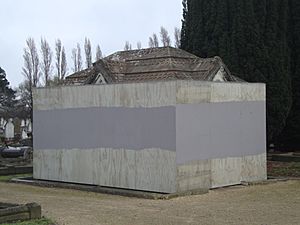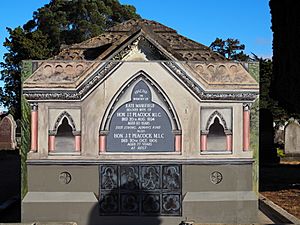Linwood Cemetery, Christchurch facts for kids
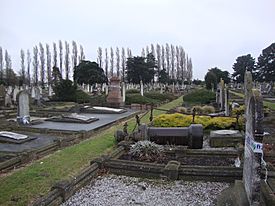
Linwood Cemetery with some damage visible from the February 2011 Christchurch earthquake
|
|
| Lua error in Module:Location_map at line 420: attempt to index field 'wikibase' (a nil value). | |
| Details | |
|---|---|
| Location | |
| Country | New Zealand |
| No. of interments | 19,948 records |
Linwood Cemetery is an old cemetery in Linwood, Christchurch, New Zealand. It's the fifth oldest public cemetery in the city. Even though it's old, people can still bury ashes there. It's also used for Jewish burials and if families have space in their existing plots.
The cemetery opened in 1884 and has had about 20,000 burials. The very first person buried there was the wife of the Sexton (the person who looked after the cemetery). This happened in July 1884, even before the cemetery officially opened. For many years, a tram line went right into the cemetery. You can still see parts of the old tram tracks under the road today! The city council even built a special tram to carry coffins, but it was never used.
Some human remains from an older Jewish Cemetery were moved to Linwood Cemetery. A special memorial was put up for them. Sadly, this memorial was damaged during the February 2011 earthquake.
After the Sexton's house was removed in the 1980s, the cemetery wasn't looked after very well. People started to damage it. Because of this, a group called the Friends of the Linwood Cemetery was formed. They are a charity that helps keep the cemetery tidy and promotes it as an important historical place for Christchurch.
Linwood Cemetery is the final resting place for many important people. This includes 13 Christchurch mayors and several Members of Parliament. Also buried here are bishops, ministers, and the Peacock family. The Peacock family was famous for their kindness and for giving money to build the beautiful Peacock Fountain in the Botanic Gardens.
Contents
Where is Linwood Cemetery?
Linwood Cemetery is located on Butterfield Avenue in Christchurch. It's behind Bromley Park, which is off Buckley's Road. You can easily get there by bus from the city centre or New Brighton. There are other cemeteries nearby, like Bromley Cemetery. People sometimes get them mixed up with Linwood Cemetery because they are all in the same area.
A Look at the Cemetery's Past
Linwood Cemetery is the fifth oldest cemetery still around in Christchurch. It opened in October 1884. This happened because people were worried about burying people in the busy city centre. The area where the cemetery was built used to be sandy hills covered in plants. It was far outside the city back then.
The first person buried there was Sarah Freeman in July 1884. She was the Sexton's wife. The Mayor of Christchurch, Charles Hulbert, and other important people attended her funeral.
After a lot of discussion, Linwood Cemetery got its own tram line. Building the line started in November 1885 and finished by March 1886. It officially opened in April 1886. At first, it was the end of the line from the city. People had to walk across the cemetery to catch another tram to New Brighton. By January 1887, the two tram lines were connected.
The city council built a special tram to carry up to four coffins. They hoped it would be cheaper than hiring a funeral director. But the idea didn't work out, and it's believed the tram was never used. In 1888, the council thought about removing the tracks, but they never did. The tracks are still faintly visible today, even though they are covered. Linwood Cemetery might be the only cemetery in the world that had its own tram line!
The Jewish community in Canterbury had bought land for a cemetery on Hereford Street. Between 1865 and 1890, 34 burials took place there. When the new Linwood Cemetery opened, it had a special Jewish section. The old Hereford Street cemetery wasn't used anymore. By 1924, it looked messy. The Jewish community decided to move the remains to Linwood Cemetery and sell the land. A special law was needed in 1943 to make this happen. The remains were re-buried at Linwood Cemetery. A memorial stone marks the spot, explaining that the remains were moved from the Hereford Street Jewish Cemetery.
In 2005 and 2006, the Christchurch City Council created a plan to protect Linwood Cemetery. This plan recognized the cemetery as an important historical site and a valuable green space. It also explained how to look after it.
A Sexton lived in a house at Linwood Cemetery until the early 1980s. From the late 1980s to 1999, the cemetery was neglected. No one was looking after it, and vandalism became a problem. After a public meeting, a small group of local volunteers started to keep Linwood Cemetery tidy. They also help people understand its value as a green space and a heritage site.
The Friends of Linwood Cemetery Charitable Trust continues to research the cemetery's history. They also do conservation work. The cemetery is almost full now. New burials are mostly possible only in the children's, ashes, and Jewish sections.
The Friends of the Linwood Cemetery
Following suggestions in the cemetery's Conservation Plan, local people who had been helping tidy the cemetery since 1999 formed a charitable trust in November 2006. Their goal is to "conserve and maintain the heritage of the Linwood Cemetery for future generations."
The Friends of Linwood Cemetery Charitable Trust organizes regular working bees to clean up the cemetery. They also record information about the graves and the people buried there on their website. They share information about the cemetery through articles and events. They also raise money for projects to help protect the cemetery's important historical features.
In November 2011, a company called Dulux donated paint to the Trust. They used it to paint a special artwork called a "trompe l'oeil" (which means "trick the eye") on a temporary cover over the Peacock Mausoleum. This artwork covered up graffiti. The artist Anne Holloway created the painting, which was finished in August 2012.
Famous People Buried Here
Many well-known people are buried at Linwood Cemetery. This includes at least thirteen Christchurch mayors and several members of parliament. Bishops and ministers are also buried here. The Peacock family, who helped create the famous Peacock Fountain in the Botanic Gardens, are also buried here.
Many of the first settlers who arrived on the First Four Ships are buried in this cemetery. There are also 54 Commonwealth war graves from World War I and World War II. Memorials to over 300 ANZACs (soldiers from Australia and New Zealand) are also found at Linwood Cemetery. The cemetery is important not just for its famous graves, but because everyone buried there played a part in shaping Christchurch and New Zealand as we know it today.
Some notable individuals buried here include:
- Samuel Paull Andrews (1836–1916), a Member of Parliament.
- Edwin Blake (1830–1914), a Member of Parliament.
- Thomas Edmonds (1858–1932), who made 'Sure To Rise" baking powder. He also published New Zealand's best-selling book, the Edmonds Cookery Book.
- Arthur Dudley Dobson (1841–1934), a pioneer surveyor and engineer. Arthur's Pass is named after him.
- Robert McDougall (1860–1942), who gave money to build the Robert McDougall Art Gallery.
- John Thomas Peacock (1827–1905), a businessman and politician who was known for his kindness.
- Henry Suter (1841–1918), a zoologist who studied animals.
The following former Mayors of Christchurch are buried at Linwood Cemetery:
- Aaron Ayers (1836–1900), the 14th Mayor of Christchurch.
- James Gapes (1822–1899), the 9th Mayor of Christchurch.
- Thomas Gapes (1848–1913), the 20th Mayor of Christchurch.
- Charles Gray (1853–1918), the 17th Mayor of Christchurch and a Member of Parliament.
- Henry Holland (1859–1944), the 31st Mayor of Christchurch and a Member of Parliament.
- Charles Hulbert (1841–1926), the 13th Mayor of Christchurch.
- James Jameson (1824–1896), the 4th Mayor of Christchurch.
- Charles Louisson (1842–1924), the 15th Mayor of Christchurch.
- George Payling (1854–1909), the 27th Mayor of Christchurch.
- William Prudhoe (1832–1908), the 18th Mayor of Christchurch.
- William Reece (1856–1930), the 23rd Mayor of Christchurch.
- Henry Thomson (1828–1903), the 10th Mayor of Christchurch and a Member of Parliament.
- William Wilson (1819–1897), the 1st Mayor of Christchurch.
See also
 In Spanish: Cementerio de Linwood para niños
In Spanish: Cementerio de Linwood para niños
 | Frances Mary Albrier |
 | Whitney Young |
 | Muhammad Ali |


